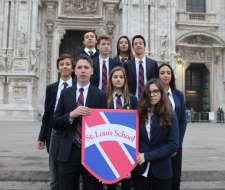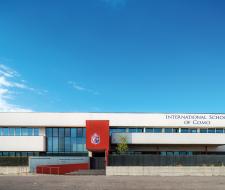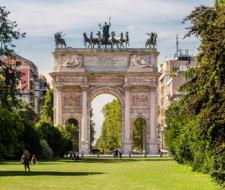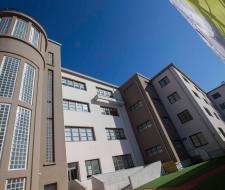Secondary education in Italy for international students
This content was developed and approved with active participation of Esther Diaz.
In the process of preparing the material, we referenced the following sources:
- https://www.internations.org/italy-expats/guide/education
- https://en.wikipedia.org/wiki/Secondary_education_in_Italy
-
 In 2022 an average IB score made up 37
In 2022 an average IB score made up 37 ItalyMilanCurrently watching: 6from 8410.00 € / term
ItalyMilanCurrently watching: 6from 8410.00 € / term -
 In 2022 an average IB score made up 34
In 2022 an average IB score made up 34 ItalyMilanCurrently watching: 3from 11205.00 € / year
ItalyMilanCurrently watching: 3from 11205.00 € / year -
 from 49413.00 € / year
from 49413.00 € / year -
 In 2022 an average IB score made up 37
In 2022 an average IB score made up 37 ItalyMilanCurrently watching: 2from 25000.00 € / year
ItalyMilanCurrently watching: 2from 25000.00 € / year -
 from 16000.00 € / semester
from 16000.00 € / semester -
 from 13430.00 € / year
from 13430.00 € / year -
 In 2022 an average IB score made up 33
In 2022 an average IB score made up 33 ItalyFlorenceCurrently watching: 1from 10380.00 € / year
ItalyFlorenceCurrently watching: 1from 10380.00 € / year -
 In 2022 an average IB score made up 35.5
In 2022 an average IB score made up 35.5 ItalyBolognaCurrently watching: 1from 9950.00 € / year
ItalyBolognaCurrently watching: 1from 9950.00 € / year -
 from 20250.00 € / year
from 20250.00 € / year -
 In 2022 an average IB score made up 35
In 2022 an average IB score made up 35 ItalyMilanCurrently watching: 2from 8220.00 € / year
ItalyMilanCurrently watching: 2from 8220.00 € / year
Prestigious education in Italian primary and secondary schools is an excellent opportunity to get high-quality knowledge and a certificate that meets international standards, as well as to get acquainted with many attractions and sights in Italy. Due to the list of TOP-10 primary and secondary schools in Italy, you will definitely find the most appropriate option for you.
Alternative destinations
Education System in Italy
Italy's educational system encompasses three key levels:
- Primary school (5 years)
- First cycle of secondary school (3 years)
- Second cycle of secondary school (5 years)
Foreign students in Italy can pursue their education in private boarding schools or international schools. They can commence their secondary education after completing the 8th, 9th, or 10th grade, or alternatively, enroll in the International Baccalaureate program.

What would you say is the most important when choosing a school?
This is the quality of support and work of the management, the opportunity to study at IB, the prestige of the school and the percentage of successful completion of the diploma stage of IB, recommendations for further universities. It is worth considering the national "recruitment" of campus students, opportunities for extracurricular development and activities, the availability of medical services and consultations, opportunities for language immersion. Is education at the chosen school based on the values you share? Is the school a close-knit community? Is academic support good?
Accommodation in Secondary Schools in Italy
Schools in Italy cater to foreign students with accommodation choices that include living with a host family or residing in a school dormitory. Host families are carefully selected by school representatives. The dormitory accommodates students between the ages of 11 and 13, offering both full and half board options. The latter entails a 5-day school stay with weekend accommodations in a family setting.
Experienced professionals overseas student activities, ensuring continuous teacher and educator supervision. Curators play an important role in helping students attain their educational goals. Schools inform parents about their children's progress through regular email updates.
Primary and Secondary Schools in Italy
- Primary School (Ages 6-11): The two-level "scuola elementare" cycle covers subjects like mathematics, writing, reading, music, drawing, and foreign languages. Additionally, students may opt for religious studies. Students undergo examinations and receive the "diploma di licenza elementare" upon completion.
- Scuola Media (Ages 11-14): During these years, students delve into natural sciences, mathematics, geography, the Italian language, history, music, art, and foreign languages.
- Secondary School (Ages 14-18): At this stage, students have the freedom to select from standard, profile, or preparatory (pre-university) curricula. The chosen profile of education during this phase often lays the foundation for future career paths.
Advantages of Studying in Italian Schools for Foreign Students
- Diverse Fields of Study: Italy stands out as an ideal destination for those seeking education in design, fashion, art, history, architecture, and more.
- Flexible Examination System: Italian secondary schools do not impose annual standard exams, instead focusing on assessments when students advance to a new educational level.
- Gateway to Further Opportunities: Education in Italian boarding schools gives access to extensive opportunities for higher education and career development.
- Preparation for Prestigious Higher Education: Studying in Italy provides students with the skills and knowledge necessary to enter respected institutions of higher education both in Italy itself and around the world.
Embrace the rich educational landscape of Italy, where top schools provide a nurturing environment for students from diverse backgrounds to excel and thrive.
Secondary schools in Italy. Cost and fees for international students
Secondary Schools in Italy
In Italy, the secondary education system consists of two key stages: Junior High School (Scuola Media) and Senior High School (Scuola Superiore). Scuola Media is for students aged 11 to 14 and lasts for three years.
Scuola Superiore accepts students between the ages of 15 and 19 and lasts five years. The upper secondary school offers different types of institutions such as Liceo (prepares students for university), Istituto Tecnico or Istituto Professionale (offer vocational and technical training).
Cost for foreign Students
Public secondary schools are generally free for all students, including foreign ones, with the exception of some fees for books, school materials, and other expenses. However, these costs are relatively low, especially when compared to private school fees or tuition in many other countries. For foreign students, though, there might be additional costs for Italian language courses if they are not already proficient in the language, as the majority of courses in public schools are taught in Italian.
Private Schools and Fees
Private secondary schools can be considerably more expensive. The fees can vary widely depending on the reputation, location, and curriculum of the school. Some private institutions, especially those catering to international students or offering International Baccalaureate (IB) programs, can charge fees ranging from a few thousand to several thousand euros per year. Foreign students might also need to consider costs related to visas, health insurance, and living expenses, especially if they are staying in major cities like Rome, Milan, or Florence, where the cost of living is higher.
Learning programs-summary information
| Name | Meaning | Equivalent | Min. age | Duration, years |
Next stage | Cost |
|---|---|---|---|---|---|---|
| GCSE | General certificate of secondary education | secondary education (non-accomplished) | 14 | 1–2 | A-Levels | 15,000 USD+ |
| A-Levels | Advanced level | secondary education (accomplished) | 16 | 2 | University | 15,000 USD+ |
| BTEC | Business and Technology Education Board | secondary special education | 14 | 2–3 | University/ work | 15,000 USD+ |
| Oxbridge Preparation | Preparing for Oxford and Cambridge | secondary education (accomplished) | 17 | 1 | University | 15,000 USD+ |
| International Baccalaureate | International baccalaureate | secondary education (accomplished) | 16 | 2 | University | 18,000 USD+ |
| Foundation/ Pathway Year | Preparatory year | admission to the 1st year of university | 17 | 1 | University | 14,000 USD+ |
| NCUK | The Northern consortium | 2 year university | 17,5 | 1 | 2 year University of NCUK | 13,000 USD+ |
| Special Preparation (Medics/Math/Business) | Specialized training | - | 14 | optional | optional | 4,000 USD+ |
| Academic English | Academic English | Language school | 8 + | 6–12 months | School or University | 8,000 USD+ |
Advantages and disadvantages of English schools
| Advantages | Disadvantages |
|---|---|
| The opportunity to enter the best universities in England, USA, Canada, Switzerland, Europe, the world | Expensive |
| High quality of education and academic standards | Strong workload |
| Perfect English after graduation | The need to change the social environment; it takes time to adapt |
| Useful contacts | The difficulty of choosing the most suitable school for the child, requires a qualified specialist |
Top 21 boarding colleges in England 2026
| 1 | Cardiff Sixth Form College |
| 2 | National Mathematics and Science College |
| 3 | Abbey College Cambridge |
| 4 | d'Overbroeck's College |
| 5 | MPW London |
| 6 | CATS Cambridge |
| 7 | Kensington Park |
| 8 | DLD London |
| 9 | King's College St Michael’s |
| 10 | Bellerbys Cambridge |
| 11 | Chelsea Independent College |
| 12 | MPW Cambridge |
| 13 | Bellerbys Brighton |
| 14 | CATS London |
| 15 | St Clare's Oxford |
| 16 | Bishopstrow College |
| 17 | CATS Canterbury |
| 18 | Bellerbys London |
| 19 | Ealing Independent College |
| 20 | Cambridge Tutors College |
| 21 | Abbey Manchester |
Literature and references
-
Italy Host School — FAQ
-
Key features of the education system: Italy
-
Secondary Education in Italy
-
The Italian Education System
-
10 Ways Italian High School is Different from American High School
-
Education in Italy — Statistics & Facts
-
Education System in Italy
-
Secondary education in Italy — Wiki
-
A Guide to Education & International Schools in Italy
